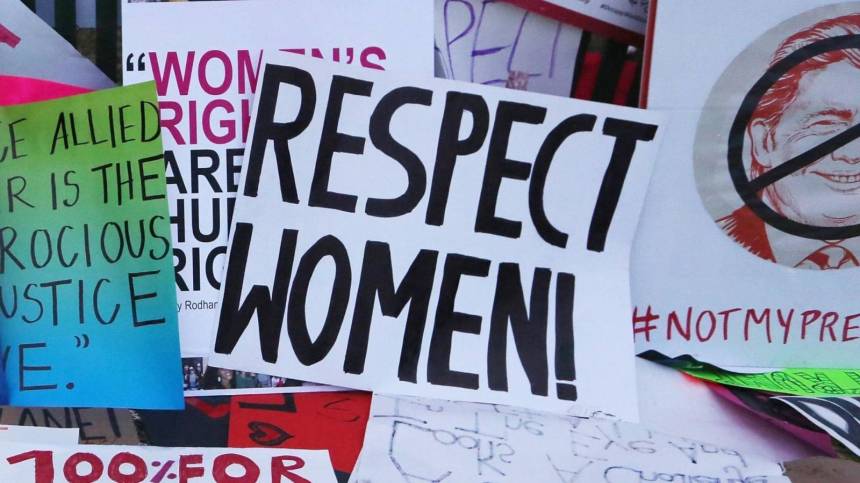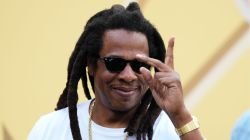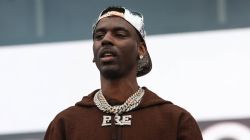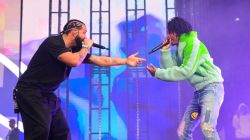When Dr. Dre confidently proclaimed “Bitches Ain’t Shit” on his seminal debut The Chronic in 1992, we all bobbed our heads to the groundbreaking album. The beat was banging and Dre’s voice valiantly took command of the track, making it almost easy to drown out the blatant misogyny running rampant throughout.
When Too $hort shouted “bitch” on nearly every song from Life Is … Too Short and What’s My Favorite Word? to Blow The Whistle, we laughed it off and let it fly under the radar along with the “boys will be boys” mentality. When 2 Live Crew released As Nasty As They Want To Be in 1989 with an album cover the United States District Court for the Southern District of Florida ruled as “legally obscene,” the sounds of “Me So Horny” could still be heard in frat houses from New York to California.
Even as Queen Latifah demanded “who you callin’ a bitch?” on 1993’s “U.N.I.T.Y.,” there was no stopping the runaway misogyny train. After all, it had already been off the rails for centuries.
But at some point, the way the music was heard started to shift, especially for women. Songs such as Beastie Boys’ “Girls Girls Girls” and Snoop Dogg’s “Ain’t No Fun (If The Homies Can’t Have None)” suddenly became less digestible as women continued to be reduced to simply expendable beings or sexual objects merely created for a man’s pleasure.
Now in the #METOO era, men are being held accountable for their patriarchal and misogynistic ways at an alarming rate, so why is the word “bitch” still thrown around so casually by countless male rappers of any and all backgrounds? For a term that’s so often used as a way to degrade and dismiss women, it’s just as prevalent now as it was in the ’90s and 2000s. Simply put, nothing has really changed.
Case in point — a mere week ago, Problem, Freddie Gibbs and Snoop Dogg released a video for the “Don’t Be Mad At Me (Remix).” In one of the skits, Gibbs is playing an aggressive game of one-on-one basketball with a woman when he says, “Damn bitch, can’t you get a layup?” As Snoop looks on, he says, “Freddie! You can’t be calling your hoe no bitch.”
While it’s intended to be funny, it again reinforces the message that women aren’t valued and are just as disposable as last night’s Chick-fil-A dinner.
In 2012, Lupe Fiasco made a heroic attempt to address the topic with the song “Bitch Bad.” As the story goes, a young boy is riding in the car with his mother when she begins to sing “I’m a bad bitch, and I’m that bitch/Something that’s far above average” as the boy hangs on to every word.
“Couple of things are happenin’ here,” Lupe spits. “First he’s relatin’ the word ‘bitch’ with his mama comma/And because she’s relatin’ to herself, his most important source of help/And mental health, he may skew respect for dishonor.”
Lupe then applies the scenario to a group of girls ages 9 to 12, only this time they’re seeing the word used by one of their favorite male rappers.
“They’re young, so they’re malleable and probably unmentored,” he continues. “A complicated combination, maybe with no relevance/Until that intelligence meets their favorite singer’s preference/’Bad bitches, bad bitches, bad bitches/That’s all I want and all I like in life is bad bitches, bad bitches.’
“Now let’s say that they less concerned with him/And more with the video girl acquiescent to his whims. Ah, the plot thickens/High heels, long hair, fat booty, slim/Reality check, I’m not trippin’/They don’t see a paid actress, just what makes a bad bitch.”
What Lupe’s trying to illustrate is how impressionable kids are and how early exposure to misogyny can have a profound, long lasting (sometimes permanent) effect on how they view themselves and others.
But still, it continues.
Interestingly enough, there’s a gaggle of women who’ve chosen to embrace the word “bitch” in an effort to take it back and diminish its perceived power — and that’s worthy of analyzing.
In a study titled “Reclaiming Critical Analysis: The Social Harms of ‘Bitch,'” authors Sherryl Kleinman, Matthew B. Ezzell and A. Corey Frost noted “women who ‘reclaim’ the term — by declaring themselves ‘bitches,’ calling other women ‘bitches’ in a friendly way, or using the term as a female-based generic — unwittingly reinforce sexism.”
Unlike the term “feminist,” which is tied to an entire movement aimed at social change, they concluded the word “bitch” provides nothing but a “false power” and challenges “neither men nor patriarchy.”
But still, it continues.
Admittedly, when a woman uses the word to refer to herself or her friends in an empowering way, it’s a lot easier to swallow then when a man flings it in our direction. Does that make it right? That’s up to the individual — there are a myriad of traumatic events, generational conditionings and socio-economic issues that can influence how one interprets it. Whatever the case, there’s an overwhelming sense (most) women are fed up with the constant disrespect — and pressing fast-forward.
On July 3, Janelle Monáe used her Twitter platform to speak out against Hip Hop’s torrid love affair with misogyny and called for men to become accountable.
“I really only ever wanna hear women rapping,” she wrote. “The amount of misogyny from most of men in rap and music is infuriating. We need to abolish that shit too. Y’all can’t wait to call women every bitch, hoe, discuss violent acts against women, etc for clout in rap, rock, and through out music history.
“Misogyny has NEVER been okay yet it has become normalized. Women didn’t create misogyny, y’all did. SO YOU DO THE WORK to ABOLISH IT. The only gas lighting I accept is the gas we lighting to burn down the misogyny.”
On the flip side, women who currently monopolize the mainstream rap spotlight aren’t lyrical MCs rocking hoodies and jeans like Rapsody, Sa-Roc, Bahamadia or Che Noir. No, it’s Cardi B, Nicki Minaj and Megan Thee Stallion whose raunchy “sex raps” dominate the conversation and the Billboard Hot 100 chart.
But how did we get here? Were women so tired of being dragged down by misogynistic ideals they decided, “If we can’t beat ’em, might as well join them?” Is the “sex sells” mentality too hard to resist when it’s always the low-hanging fruit?
While artistic freedom is undeniably important, male rappers’ use of the b-word as a way to refer to a woman is growing tiresome. Scratch that, it’s been tiresome. Not only that, it’s predictable, lazy, boring and shows an obvious lack of creativity.
So please, stop calling women “bitches.” Your mothers, daughters, grandmothers, wives, aunts and girlfriends will thank you.












Maybe because female rappers still call themselves bitches
It’s rap music. It’s rugged. It’s offensive. If you don’t like it, there’s plenty of other genre’s for you. If you don’t like violent films, you don’t have to watch them. If you don’t like vulgar music, you don’t have to listen to it. The way we talk in the street is the way we rap. If it wasn’t, it wouldn’t be rap music. The word is RAP. Like a CONVERSATION.
lol preach.
Because nothing has really changed in the environments around us other than technology. People remain the same, just a little more aware.
I agree to an extent but when women don’t even respect themselves in hip hop..why would the men?? It’s that simple. The top female rappers aren’t good role models for young girls. Women do refer to each other as bitches but saying it hurts more when I guy says it is a cop out. In a perfect rap world, the conscious female rappers would get more shine and respect would eventually follow but until record labels and even listeners start embracing the more conscious rappers, nothing will change. This is something more deep rooted and I believe Women have to take a better stand on this..the can’t beat them join them is not an excuse. All I see from women in rap is over exposing and sex talk and that influences other women wether it’s on social media or just another female rapper. Men at least have better role models to look up to..Coles and the Kendricks and Drake rarely refer if ever to women as Bitches and you had one of the biggest and greatest entertainer of all time Kanye give up secular music all together..I think the men are already halfway it’s the females that need to meet us there. Take A stand stop with the over sexualizing..you have young girls imitating slutty behavior..How can we call that a Queen?
Female rappers with class get no support from FEMALES. It’s women perpetuating this hood rat culture, not men. I’m not condoning anyone being sexist or degrading anyone, but don’t bombard me with “Mulatto”, “Megan their Stallion”, “Mulatto”, “Asian Da Brat (stupidest name ever) and a hundred other skanks in rap that do nothing but degrade themselves and other women, then turn around and blame men for it. That’s weak. Women need to support classy women, but they don’t WANT to. WHY? Make an article about that.
Funny thing nobody say shit about rock music or any other music that disrespects women so easy to blame black men
I feel like this fight was lost when the majority of women call themselves and other women bitches. And not in a “reclaiming the word” type of way, but in the same exact same way guys do. If anything it’s lost it’s edge of being misogynistic and is now just equivalent to ‘guys’.
I was wondering the same thing. Seems like “bitch” is getting thrown around even more now. I rarely hear the words “girl,” “woman,” “lady” or hell even “chick.” I mean, even some of my favorite rappers just be calling women “bitches” when there isn’t any kind of “bitch” behavior being talked about on the song. Makes me want to listen to new rap even less than I do now.
I’d still smash tho
Most male rappers are actually bitches more than female rappers…Fact.
But women can….nvrmnd
Sticks and stones bitches
Please stfu …. People have a right to free speech just like 99% of the female rappers out now only talk about WAP. Maybe you wouldn’t wouldn’t be called a beech if you wouldn’t act like one
The answer is actually the same answer to the question at the title, its because the audience literally speaks like that and you wanna try and cater to the audience. I think its more offensive to hear “why is male rappers” instead of why are male rappers than it is to hear the word bitch. There should be a war on bad grammar and illiteracy in hip hop instead because too many hip hop heads just proudly sound stupid with the way they choose to speak and write and here you guys are celebrating it smh
“IS” APPLIES TO “THING,” which is singular. Nice try tho dumbass.
Kettle guy, your grammar analysis is wrong, go back to school. “Is” is the correct word in this context.
First off, I think it’s not the word but the context/how, and/or who is using it. You may not mind YOUR friends/family saying words like niggas, bitches, etc cause you KNOW them. It could be a form of greeting like how some people call others their MOTHERFUCKERS.
Second, if people think something like this should change, then they need to show it with their wallet as well as reviews. Mainstream rappers like Drake, Lil Wayne, Future, Young thug, and etc have fanbases where women make up a good amount if not the Majority.
They not calling all womens bitches.
But they should not use it, still.
They turn up to the music & call themselves tht word yet we’re the bad guy. I digress
Third, most important I think, we have to give the conscious rappers more exposure. When people say hip hop is all about club/stripper life, people mention Lupe Fiasco, Rapsody, Tierra Whack, Wale, etc, but NONE OF THESE RAPPER’s ALBUMS get nominated. But the ones that do are MAINLY CLUB/STRIPPER albums/songs.
Nah, those preachy hypocrites are boring as fuck. Go watch a BBC film, I’ll be watching John Wick, dumb-dumb.
Funny how people say these “preachy hypocrites” are boring but then they look up their lyrics and songs after they die like Nipsey and Mac Miller. There’s more to hip hop than just sex, drugs, and guns like John Wick. Do your research so you won’t sound ignorant.
Why is black people calling each other ‘n*ggas’ still a thing in 2020?
Exactly
Really? So wtf happen to the comment section?
Nothing happened to the comment section. Are you ok?
Great commentary. Our women deserve better than that. If we don’t protect them, who will?!
Nah, they don’t. This is some race baiting bullshit.
BARFFF NO THE FUCK IT IS NOT. It’s a respect women thing dipshit.
COMMENTS FOR THIS POST ARE DISABLED
Uh, no they’re not.
Maybe, just maybe it’s because the way the mothers (black women) are raising them.
It’s not a black/white thing.
Yes it is. White people don’t refer to women as bitches NEARLY as much as black guys do.
Shut up. Not EVERYTHING is racially motivated with some clandestine agenda behind it. The woman asked a fair question. The horrible responses from these same people you’re seeking solidarity with is what you should be more concerned about. We can’t just blame the other race for everything. That’s weak and not productive.
Shut up, with your dumb ass comic book name. You sounding like a bitch right now. You always do.
I totally get the authors point with this highly illuminating think piece. However, have you considered that there are two things I’ve never seen and that is a turtle with speed and a b1tch I need?
If anyone takes offense to this article, it’s because they’re the problem. Grow up and do some soul-searching. I bet money you wouldn’t call your grandmama or mama a bitch or speak in that tone around them ever. You know you’ll get handled.
YOU have a problem with the first amendment, dummy. Do some soul searching yourself, and read up on the constitution while you’re at it.
Hey YourSlow–u are a broken dick. He’s right, would you call your momma a bitch? You were raised by one of you do. Free speech has nothing to do regarding respect or being assigned a title because of how you act.
If she acted like one I would….
You apparently didn’t read the article if you think she said rappers can’t say that shit. Obviously they can, but in doing so, it shows their lack of creativity, misogynist mind-state and inability to think outside the box their 90’s gangster rap predecessors put them in. People can always be trashy woman haters, but the argument here is that music and the culture as a whole would be better off if men looked inward, held themselves and each other more accountable and stepped their pengame up as a result. There’s a reason Rakim is considered the god emcee, because he never used trashy language like this but still got his point across AND sounded hard af while doing it.
Bitches aint shit but hoes and tricks. 2020 is so soft and these 90’s and 2000 babies are weak. They couldn’t make it back in the day.
For once, I agree with you. PC Babies…P*ssy Children Era Indeed….smh
I don’t agree with this at all. Rap is outlaw music. It’s supposed to be a politically incorrect place where people speak their mind freely without consequences to entertain the audience, just like a stand up comedian. Female rappers can refer to men by every word under the sun and so can men. It’s the one fucking genre where your language isn’t heavily policed, the one genre where people can vent and be vulgar and say shit people “shouldn’t say”. That’s the appeal of it. That’s why young people love it, that’s why it’s the most popular genre today. Because it still feels fucking alive!
hip hop is about uplifting the community…using the word does the opposite. Not only that, but it’s just lame and boring af these days. There’s nothing new or fresh about it and it’s not a good way for an emcee to flex their lyrical prowess or diverse lexicon. Looks like the author is just trying to challenge emcees to do better. That’s good for the culture. Pushing emcees to get more creative will never kill rap.
Rap is music of the street so a lot of the language will be street language. Are all women bitches no but all women are also not queens. If you’re using a street vernacular most street women are bitches. However women only care about their feelings.
When Dr. Dre dropped “bitches ain’t shit” in 1992, we bobbed our heads to it. REALLY? How old were you in 92, poser? 3? 5? LOL
Who Cares. I’d still smash her tho
haha you know NOTHING. Do your homework. The author is an OG in hip-hop and has paid her dues for years. And she def. wasn’t a toddler in 92. Keep reaching…there’s nothing you can say to justify using the word, period. All these disgusting comments show exactly how far hip hop still has to go. It’s filled with misogyny and homophobia. Shit’s kind of pathetic.
Yep, you guessed it smart guy.
Momma and my sisters never showed off their bodies like sluts. They never used foul language. Anyone that don’t behave like a lady is a bitch! Don’t justify it or get mad. If a man acts like a total girl, you call him soft or fruity. It is what it is.
Called values, respect, and decorum. Bitch ain’t got none of those qualities.
Because bitches ain’t shit but hoes and tricks
Lady’s we just ain’t talking bout you cause some of these…… B,#£tches too
Paul dats magic diggy Daniel’s hates your editorial
Ban the words “nigga” and “bitches”. Embarrassing at times to play my music or hear it loud from other cars in traffic full of women or white people
Nice, get rid of the first amendment. That’s a great idea!
Women call each other bitches far more than men do. But it’s pretty hilarious that the word “bitch” is an issue but apparently “nigga” is just dandy. Out of the two, one is clearly more volatile than the other. Sorry but political correctness is the anti-thesis of what hip hop is.
Nigga is NOT dandy and should be trashed too.
because the women that these “boys” play with ARE BITCHES!!! there’s not a professional, classy, self respecting woman in the bunch. and don’t you DARE throw out any names in the industry because you’ll be looking real ignorant at what a “lady” is supposed to be about. None of them care, love, support anything. They are only there to “get the bag” or take it from a man using their pussy. Bitch please.
Cause real life isn’t 22 year old feminist on twitter
But male rappers all everyone bitches lol everyone is a bitch to every male rappers, specially all these sorry ass dudes in the comments lmao.
“Wonder Why They Call Ya Bitch” by 2pac
Or this one: Ice-T Bitches 2
Ffs. It’s hardly like 2Pac is referring to all women in this song is it? Its not a song promoting the message that all women are bitches. What is up with all you fragile incels in this comments section?!
“F*ck a b*tch, don’t tease b*tch, strip tease b*tch,Eat a bowl of these b*tch, gobble the d*ck, H*es forgot to eat a d*ck, can shut the f*ck up, Gobble and swallow a n*t up, Shut up and get my cash,
Backhanded, pimp-slapped backwards and left stranded” Kurupt Xxplosive
Easy, you ladies hate to admit it but you all like them bad boys, before the shooting I was still saying Megan was holding women back because she doesn’t mind her man calling her a bitch, you call each other bitches all the time, I love my black queens but look in the mirror. This is why I have all the upmost respect for Ciara, she mess around with the same stereotypical individual, Bow Wow 50 and Future, that hot boy out on the block type, and got with a real representation of a strong black man in Russell Wilson and living her best life. What I’m trying to say black men come in varieties, dont let type that attracts you have you feeling like we all ain’t shit because there are good ones out here but not getting a fair chance
I believe the 1st amendment might have something to do with it. Instead of trying to exert control over what male artists say…stop listening to them. For example, I haven’t heard WAP nor do I plan to. At the same time I’m not trying to censor female rappers either.
If you have a problem with this article you are uncivilized and lack a fundamental understanding of what hip hop is about. It’s music of the streets, yes, but it’s also supposed to uplift the streets (including women) and bring it’s people up. Bitch is a word of the oppressor, just like Nigga is. Anyone making excuses for this shit is just unwilling to look at their own inherent misogyny or self oppression. You’ve all been conditioned by the systemic white supremacy and misogyny so damn much that you’re literally arguing for the right to oppress yourselves and your female counterparts. The solution starts with ourselves, and in regards to this specific topic, it starts with us men, holding each other accountable and to a higher standard. You can be a part of the problem, or the solution…you choose.
More victim mentality type beta males in this comment section. Ha! White supremacy? Systematic racism? You sound like a CNN parrot. There’s no such thing of any of that shit you are blaming, fool. If people can hop our borders, sell flowers on corners, sell fruit, speak zero English and still make some kind of life for themselves in the States, than anyone can do it. You blacks have been here for hundreds of years. At this point if you can’t make ends meet, it’s a personal problem you all need to work out. Maybe you all should go pick fruit in the fields like the migrants do, because it seems to work for them.
Its simple
Most women dont respect men either
They think they are princesses and queens and their not
Most women are bitches
There’s some that aren’t tho
Call em like I see em.
Bad enough, same as the n-word.
Women use the b-word on themselves, but don’t want men calling ‘em same; same way black men use the n-word amongst themselves but forbid other races using it on ‘em…
Kyle: really good article and I implore you to continue doing more of this, but just FYI you are allowed to go more than 10 sentences without mentioning what someone said on Twitter.
‘We went from brothers and sisters to niggas an bitches’.
Hip-hop is fundamentally flawed. No one will show respect until you respect yourself
“I rather be your B-I-T-C-H” – Megan Thee Stallion
If you want Hip Hop/Rap music to be politically correct, then it might as well not exist AT ALL. Most of it is about things pertaining to competition, the hood, or just creating an image for expression. But outside of that, why would a woman hear the word “bitch” and be offended if it wasn’t specifically being said to them? Oh, because of the #METOO movement where women make being hoeish and showing their augmented tits and ass and calling each other bitches and thots and being proud of thirst traps and on and on, ALSO want to be Queens at the same exact time, It does not work that way and that is what is reflected in the music. If you aren’t a bitch, no one is talking to you, if you are, then look in the mirror. Period.
Haha. Who wrote this? Ben Shapiro? Laaaaaameee.
Women love confident men. If men didnt actually succeed getting women this way, it wouldnt be everywhere. Some would like to believe men create this image and cling to it stubbornly, as if women do nothing in the way of positive reinforcement. That is false. If women collectively want better, they have to collectively make different choices.
And it begins by not dressing like a hoe
Ask yourself if women behave in the way to gain respect. Only that you demand respect doesn’t mean you deserve to get it
So why are the sell out black men allowing themselves to be used like that? Oh for money, right? Lol you phucking clowns will use any excuse to justify wherever your people fall short. Why don’t you take responsibility for once? ‘It’s whitey’s fault’ is why nobody takes you people seriously. Blame whitey, yet you clowns let white liberals lead you around by the collar in those so-called “protests” which are really just riots and looting that ends up destroying immigrant owned businesses and minority neighborhoods.
lmao weirdos listen to a different song if you dont like it, rap is not for you youre ruining it haha its still a thing because some of u ns is bs too
I see anti Trump sign, so I see what You are about and who You are. Just to clue You in – left wing propaganda, part of Biden campaign – the guy who is puppet of the marxists and left wing politics.
Uhmmm… News flash. Rappers actually say it the least compared to OUTSIDE of rap. To quote Jay-Z, “women get respect b*tches get what they deserve”…
DON’T LISTEN THEN. F*ck is wrong with people? If you don’t like something, pay it no mind. PERIOD!
WHY ARE*
It’s actually right because of “still a thing” at the end of the question. It would be are if the question was only why are male rappers still calling women bitches?
HAHA YOU ARE SO DUMB IT HURTS
I STAND CORRECTED
“Never call you bitch again” by 2pac was a great song. Actually the remix with Tyrese that got an official release was my favorite version
Because bitches ain’t shit but hoes and tricks.
HAHAHA TYPICAL. You are exactly the problem.
Calling them selves bitches but mad that we do it lol gtfoh??????
Listen to 2pac “all eyes on me”…
It’s fucked up, but some women actually embrace the term. They may not accept it coming from just any man necessarily, but they call each other bitches. Like the only reason why there’s ppl of all colors that say nigga because we black ppl have embraced the term. Not saying it’s wrong or right just facts. Women control what’s cool in mainstream hip hop. If they demanded to stop being called bitches they would. Period
Write another one on why black women call black men niggas in 2020
Because they are black, shit like the whole #MeToo thing doesn’t concern them. That is just to lower white birth rates. If a white man even looks a woman, its sexual harassment and instant #MeToo cancellation of dude and prison time. But a black man can call women hoes and bishes and all that, it’s all good.. even “Kosher”.. get it 😉
And thats a huge uncomfortable truth you kinda touched on there. The reason everyone is getting cancelled for “MeToo” except for rappers is because it touches on a very uneasy truth about whats common in black/hip hop culture in general.
You cancel some random white celebrity who cares. You can pretend guys like that are an isolated incident but you start noticing rappers who talk about hitting women, drugging women (Lookin at you Rick Ross), get caught hitting women and other shit you realize its damn near wholesale accepted across the board. Very few people of note are calling out hip hop for its misogyny. Shout out to Janelle Monae. She can do it, if a white celebrity where to try to bring up how bad hip hop is they will probably get fried as being a racist or dog whistling.
Its gonna take self-correction from within the community. But i dont think one bit that hip hop causes misogyny. I think hip hop is just reflecting general attitudes of street dudes toward women.
You gotta think these rich and famous rappers have women throw themselves at them 24/7 and probably see them as disposable and valueless because of that. Hell, even the ones who were just decently successful drug dealers in there local area before they rapped have women throw themselves at em hoping to get knocked up by a dope boy who gonna take care of em until they finally go to jail.
Unforuntately the kinda people who write for hip hop websites are probably college educated squares who aint never been in the streets and dont know how people get down in the hood. Its all thereoretical to people like the writer of this article. They dont really know shit about the harsh realities of the street life but from what they hear in the rap songs they write about.
Context is important. Sometimes the word is misogynistic, sometimes it’s not. The word itself is not important, because we could just as easily change the word and still think of females as 2nd class citizens. Censoring yourself just makes things phony and gives real misogynists plausible deniability.
Because women make songs like WAP and use musical history as an excuse to be vulgar (slob on my knob). Progress can’t start until someone puts it in motion. Until then hip-hop culture and it’s negative societal effects are a self-licking ice cream cone.
*looks around*
These bitches is whylin
Bytch please
Woman dont get called bitchs its an oxymoron.m bitches r bitches.
Because it’s 2020 and women are still acting like bitches.
*why ARE.
NO NO NO!!!! You’re WRONG….”male rappers calling women bitches” is a singular act in this instance…..hence the IS.. IT’S NOT PLURAL. Think of it this way “Why is still a thing. If you replaced is with are in the title and read it entirely it wouldn’t sound right.
IF the article was titled “why ARE male rappers still calling women bitches in 2020” then it would be ARE
Is very hard to see a man call a woman who handle her business bitch, listening to 2pac you wonder why they call you bitch, you will understand more…
Nonsense. The top female rappers dont even respect themselves now with this WAp trash how they expect anyone else to respect them?
The word ‘bitch’ is not synonomous with woman. It refers to loose woman (no pun intendted) who have low morals and jump from one bed to another like a flea jumps from one dog to another dog. If woman don’t want to be called bitches then simply stop being bitches.
Spoken like a real bitch
What kind of nonsense question is this? Dude it’s part of the culture, pretty much always has been. Why rappers still talk about murder (somehow calling women bitches is a much worse problem)? But with many other things we’ll bask in our ignorance and wonder things like this with the answer right under our noses. But hey if you change the culture you’re bowing to “the man” so just keep on keepin on. Embrace the flaws instead of addressing them…it’s been that way for a while man…you must be young,
“Embrace the flaws instead of addressing them…it’s been that way for a while man…you must be young” maybe the saddest thing I’ve read in a while.
Ignorance is present
I’m pretty sure a woman wrote this article. Check the author’s profile. If a man had written this he’d be the simp sergent lmao
Didn’t this site recently give Chris Brown, a domestic abuser, 4.4/5? Don’t boost things up if you think they’re bad.
Hmm…. It is sells they will sell it. Hip-hop is the most popular genre going so I have to assume those buying it it like it. Including women. Maybe talk to them about why they continue buy product that dehumanizes them in a era where there has been so much written and said on the matter.
I mean there has been over a century of discuss on the issue is various forms and yet here we are with females taking to the dance floor for the next hyper than hype track be it hip-hop or bro-country to dance and sing-a-long to lyrics that many claim are questionable.
I saw the same thing in the 1980s with Glam Metal and Emo in the 00s. If the masses didn’t support it the game would change in a snap because money talks. Problem is too many women simply like the music regardless of content.
Female rappers refer to themselves as way worse
shut ya bitch ass up
Are. The proper word is Why ARE male rappers calling women bitches. Maybe have an editor worth anything proofread the title.
The “is” in the title is connected to “calling women bitches”, not to “rappers”. Read the title again without the words “male rappers” and it makes you’ll see what I mean. Not a comment on the content of the article, but the title itself is grammatically correct.
Of course my reply is messed up though lol. I meant to say it makes sense. You’ll see what I mean.
BITCH shutup
I’ve been singing songs that contain “bitch” or “hoe” or whatever since I was 10. That didn’t turn me into a misogynistic pig…
Saying that hip-hop songs cause violence and turn people into women abusers is like saying video games cause violence. It’s just not true.
Hip-Hop has always been about the freedom of expression instead of censorship, and if male or female rappers what to make songs about calling women bitches, it’s their freedom to do it. 2 Live Crew went to jail for this. At the same time, if other rappers want to make “Bitch Bad” songs, yeah… go for it… Express yourself!
They call men bitches too… Equality Bitch…
nah they right XD
In 1990’s it was hoes, 2000’s bitches, 2020 Thot’s……get with the times
Jcole tole modelz that all I have to say
But these hoes is bitches